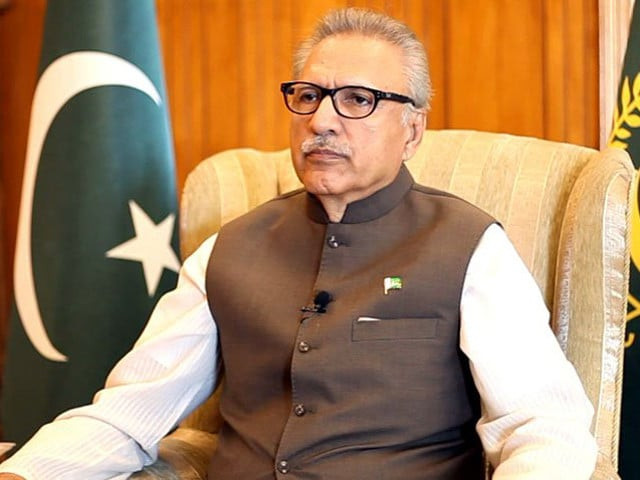Alvi offers to pour oil on troubled waters
President urges stakeholders to sit together and listen to each other

Amid growing political volatility, President Dr Arif Alvi on Friday offered to reach out to both Prime Minister Shehbaz Sharif and former premier Imran Khan to thaw the political impasse over a spate of thorny issues and find a broad consensus for fresh elections and a charter of economy.
While conditionally offering his good office for mediation, the president also urged political parties to avoid subjecting the military to controversies by dragging it into political thicket, reminding that the institution was the guarantor of the national security.
He further asserted that the military should be accorded its due respect and not targeted with controversial statements.
The president’s offer to pour oil on the troubled waters has come amid skyrocketing political mercury with relentless confrontations among stakeholders, charges of inciting mutiny in the armed forces against Imran's chief of staff and the economic woes left to bear the brunt of political wrangling.
In a meeting with journalists at the Punjab Governor House in Lahore, Alvi emphasised the need for political parties and key stakeholders to sit together and initiate a consultative process to devise a plan for holding free and fair elections and developing a charter of economy.
Alvi said that all the institutions of the country were respectable and dear to him, adding he did not believe in generating any controversy.
He said the government and the opposition in and outside the National Assembly – mainly PTI – besides the relevant institutions should consider reducing the widening schism in the country.
Read Imran sees conspiracy to pit PTI against army
“There is a need to initiate a consultative process to bring all important stakeholders to the table and listen to each other,” Alvi said, talking to the media persons at the Punjab Governor House.
However, he made it clear that the constitutional role of a president did not allow him to officially reach out to the stakeholders.
“It is the primary responsibility of the executive and the opposition in the assembly and outside the assembly and the relevant institutions to deliberate upon defusing the polarisation,” Alvi told journalists.
“The political parties and stakeholders need to sit together and chalk out an agreed way forward, especially with regard to holding free and fair elections and developing a charter of economy that could help ease the current political polarisation and economic situation,” he added.
The people of Pakistan, Alvi said, had given him the responsibility of a president. "As a president, all the institutions were respectable and dear to him but there were many avenues where improvement can be made through a consultative process."
Responding to a question, Alvi said that the stakeholders in Pakistan should only be involved in resolving the issues confronting the country without any involvement of any foreign persons or the country.
Also read Wife of Gill’s driver arrested for ‘rioting’
Alvi further said he had a very cordial relationship with the incumbent government and he accorded timely approval to all the summaries except four summaries, which were delayed while remaining within the ambit of the Constitution.
During his interaction, Alvi said that he had been the main proponent of the electronic voting machines (EVM) since long, even during the governments of the Pakistan Peoples Party (PPP) and later of Nawaz Sharif of the Pakistan Muslim League-Nawaz (PML-N).
He added that he convinced the Pakistan Tehreek-e-Insaf (PTI) for bringing the technology for the elections. The EVMs provide extremely simple solutions to conduct free and fair elections, he said, stressing the need for evolving consensus on the use of technology in the election process, which, according to him, would strengthen the democratic process in the country.
Alvi said that through Mufti Taqi Usmani, he had offered the Afghan government to provide distance learning and virtual mode of education to the Afghan students, especially female students.
He added that Mufti Usmani, during his talks with Pakistani Taliban, had told them that out of all constitutions of the Muslim world, the closest constitution to Islam was the Constitution of the Islamic Republic of Pakistan.
While commenting on the recent reports of Taliban arrival in certain parts of the country, the president said that he did not have any opinion on it, as according to reports the negotiations were under way.
He said that he was of the opinion that any such negotiations should be mandated by parliament and might be pursued in confidence to reach some amicable outcome. He added that the result should be reported back to parliament before making them public.
Alvi said that he believed that corruption was a major factor in the backwardness of any country, adding that the best ways to counter corruption was to make all financial transactions through formal banking channels, especially, by the political parties, while receiving and managing donations.
In response to another question, he said that social media was now here to stay but unfortunately, “we are not used to it and that it is difficult to control”. Therefore, he added, “we need to focus on social media and on what is happening on it”.
He noted that 90% of the social media was good and provided lots of information, but “we should learn to deal with the remaining 10% by filtering out fake news and hearsay.






1733130350-0/Untitled-design-(76)1733130350-0-208x130.webp)












COMMENTS
Comments are moderated and generally will be posted if they are on-topic and not abusive.
For more information, please see our Comments FAQ